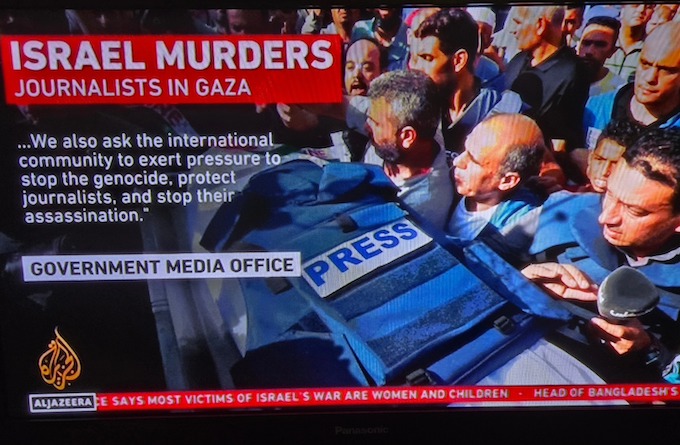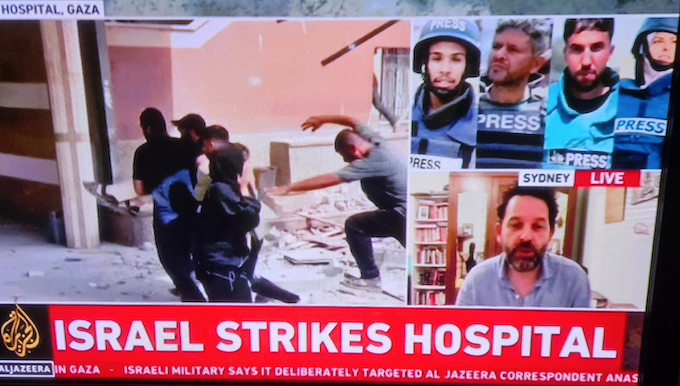
A media studies analyst has condemned the latest deadly attack by Israel on journalists in Gaza and challenged Western media over the carnage, asking “where is the outrage” and international solidarity?
Five journalists were reported to have been assassinated among 21 people killed in the air strike on the al-Nasser Medical Centre in southern Gaza’s Khan Younis.
The others killed were first responders and medical staff, said the Gaza Health Ministry.
- READ MORE: Al Jazeera’s Salama among four Gaza journalists killed in Israeli attack
- Rallies across NZ honour Gaza Strip journalists, condemn own news media
- Other Israeli war on Gaza reports
Dr Mohamad Elmasry, media studies professor at Qatar’s Doha Institute for Graduate Studies, told Al Jazeera in an interview he was “at a loss for words” over the latest attack.
Earlier this month, four Al Jazeera journalists and two other media people were among seven killed on August 10 in what the Israeli military admitted was a targeted attack.
“Israel has been at war with journalism and journalists from the very beginning of the war,” Elmasry told Al Jazeera. “They’re not hiding it. They’re very open about this.
“But the question that I have is, where are the international journalists?
‘Where is Western media?’
“Where is The New York Times? Where is CNN? Where are the major mainstream Western news outlets?
“Because when Charlie Hebdo [a French satirical magazine based in Paris] journalists were killed in 2015, that caused global outrage for months.
“It was a major story in every single Western news outlet. And I applauded journalists for coming to the aid of their colleagues. But now, where is the outrage?”
The Gaza Media Office said the death toll of Palestinian journalists in Gaza had risen to 246 and identified latest casualties as:
Hossam al-Masri – photojournalist with Reuters news agency
Mohammed Salama – photojournalist with Al Jazeera
Mariam Abu Daqqa – journalist with several media outlets including The Independent Arabic and US news agency Associated Press
Moaz Abu Taha – journalist with NBC network
Ahmed Abu Aziz – freelance journalist working for Middle East Eye
In a statement when announcing that the death toll from the al-Nasser hospital attack had risen to 20, the Gaza Health Ministry said:
“The [Israeli] occupation forces’ targeting of the hospital today and the killing of medical personnel, journalists, and civil defence personnel is a continuation of the systematic destruction of the health system and the continuation of genocide.
“It is a message of defiance to the entire world and to all values of humanity and justice.”
‘Killed in line of duty’
The UN Special Rapporteur on the Occupied Palestinian Territories, Francesca Albanese, posted on X after the Israeli strikes killed the journalists and members of Gaza’s civil defence:
“Rescuers killed in line of duty. Scenes like this unfold every moment in Gaza, often unseen, largely undocumented,” she wrote.
“I beg states: how much more must be witnessed before you act to stop this carnage?
“Break the blockade. Impose an arms embargo. Impose sanctions.”
Her remarks came after she shared a video appearing to show a second Israeli air strike during a live broadcast on Al-Ghad TV — just minutes after the first attack on al-Nasser hospital.
Albanese later gave an interview, renewing her call for sanctions on Israel.
❗️BREAKING❗️Rescuers killed in line of duty.
Scenes like this unfold every moment in Gaza, often unseen, largely undocumented. I beg STATES: how much more must be witnessed before you act to stop this carnage?
🔴Break the blockade
🔴Impose an Arms Embargo
🔴Impose Sanctions. https://t.co/FgMvIyYem0— Francesca Albanese, UN Special Rapporteur oPt (@FranceskAlbs) August 25, 2025
One of Al Jazeera’s reporters described working with hospitals as a base.
Deprived of electricity, internet
Hind Khoudary, reporting from Deir el-Balah in Gaza, said: “I’m one of the Palestinian journalists reporting from hospitals.
“We are in a two-year war where we have been deprived of electricity and internet, so Palestinian journalists are using these services at hospitals to continue reporting.
“We are also following news of wounded Palestinians, funerals, and malnutrition cases, as these are always transferred to hospitals.
“That is why Palestinian journalists are making hospitals their base and end up being attacked.”















































